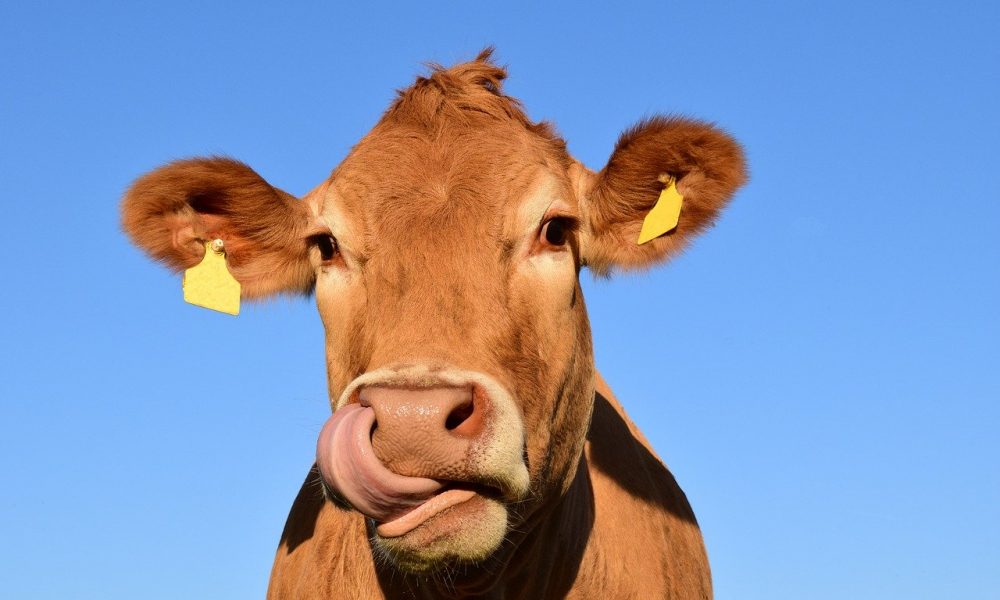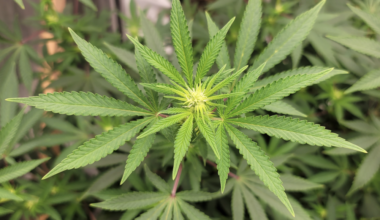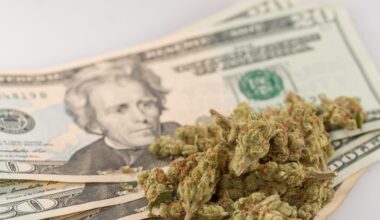Compared to the control group, the hemp-munching steers spent more time lying down and had lower levels of stress hormones.
By Suzanne Perez, Kansas News Service
A new study suggests feeding cattle industrial hemp—a horticultural cousin of marijuana—reduces their stress levels and makes them lie down more.
That could prove beneficial to ranchers because relaxed steers tend to be healthier. Researchers at Kansas State University said hemp could be a natural way to decrease stress-related respiratory infections and other ailments when cattle are being transported or weaned off their mothers.
Mike Kleinhenz, assistant professor of beef production medicine at the K-State College of Veterinary Medicine, published the results of the study recently in Scientific Reports.
“We might have a more natural way to reduce stress in cattle,” he said. “And we’re just starting to scratch the surface on some of the benefits.”
Kleinhenz’s study involved 16 Holstein steers. Over two weeks, half the steers consumed traditional feed and the other half ate a mixture of feed with industrial hemp. It’s a cannabis variety containing the chemical compound CBD with lower levels of the psychoactive component THC—the stuff that gets you high.
CBD is a popular pain- and anxiety-relief remedy.
Kleinhenz and his team tracked the cattle’s movements and also monitored their blood for cortisol and prostaglandins, which are biomarkers for stress. Compared to the control group, the hemp-munching steers spent more time lying down and had lower levels of stress hormones.
The team also found that the hemp was absorbed but did not accumulate in the steers’ systems, Kleinhenz said.
“It was kind of an exploratory study that yielded some really interesting results,” he said. “You usually don’t go fishing and find stuff like that.”
Cattle that are more relaxed could benefit ranchers when it’s time to wean them or move them to feedlots when close-quarters stress sometimes leads to respiratory infections or other ailments.
After the 2018 Farm Bill legalized hemp production in the United States, interest grew in hemp as an agricultural commodity, including as feed for animals. But U.S. Food and Drug Administration approval would be required before hemp could be fed to livestock or pets.
In 2020, K-State’s team received a $200,000 research grant from the U.S. Department of Agriculture to analyze the safety of industrial hemp as cattle feed.
New studies from the CVM’s Department of Anatomy & Physiology are helping to answer questions about the potential use of industrial hemp as a safe nutrition source for cattle. https://t.co/oK5NmgjE0r pic.twitter.com/xnVS5OpJFz
— K-StateVetMed (@KSUCVM) September 2, 2020
Currently, growers dealing in the CBD oil market hire processors to extract the oil from hemp seeds or flowers. The process leaves behind large amounts of plant material with little value.
If those byproducts, which contain trace amounts of CBD or THC, could be used to feed livestock, it would benefit cattle ranchers and keep waste out of landfills, Kleinhenz said.
“Basically it’s the old cow recycle” system, he said. “Similar to the ethanol story, where cattle are fed distillers’ grains from ethanol production.”
Follow-up studies will look at how cattle absorb CBD compounds and their potential effect on food products.
“We want to understand the whole timeline, from when an animal last consumes [hemp compounds] to when it can safely enter the food chain and not have those compounds in the system,” Kleinhenz said.
This story was first published by Kansas News Service.
Photo courtesy of Pixabay/Ulrike Leone.
Medical Disclaimer:
The information provided in these blog posts is intended for general informational and educational purposes only. It is not a substitute for professional medical advice, diagnosis, or treatment. Always seek the advice of your physician or other qualified healthcare provider with any questions you may have regarding a medical condition. The use of any information provided in these blog posts is solely at your own risk. The authors and the website do not recommend or endorse any specific products, treatments, or procedures mentioned. Reliance on any information in these blog posts is solely at your own discretion.







